Michael Bublé Can Talk About This Shit All Day
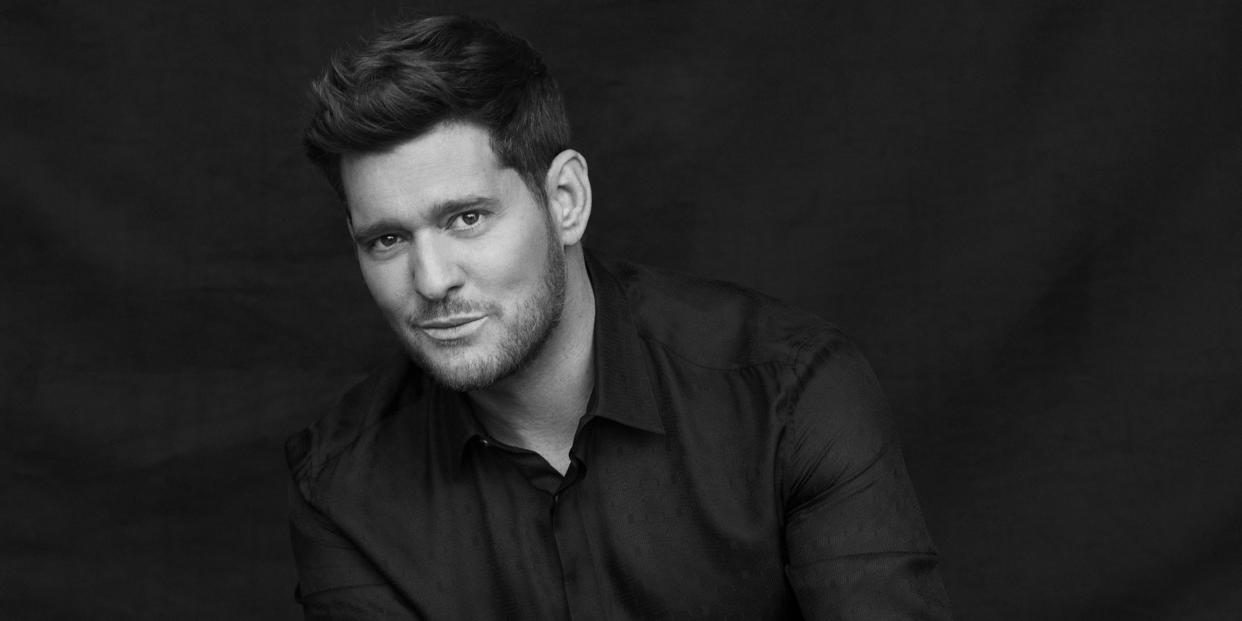
- Oops!Something went wrong.Please try again later.
- Oops!Something went wrong.Please try again later.
- Oops!Something went wrong.Please try again later.
He’s an outlier in the modern music landscape. In an era where charting crooners are few and far between, Michael Bublé has carved out a unique niche during an expansive 20 year-career where he rules with few peers. Cut from the same cloth as his 50s-era idols (see: his regular hokey Christmas specials and a penchant for recording standards), the singer has busted pop norms to record-breaking success thanks to a range of inspired spins on standards dotted and hit originals. It’s all not bad for a kid from a family of Canadian fisherman who grew up heavily influenced by his grandfather’s tastes while his classmates were obsessed with their own icons of the day, like Kurt Cobain.
Now with the recent release of his eighth studio album, Higher, complete with a peppy, eponymous rising single which sits alongside collaborations with the likes of, gasp!, Sir Paul McCartney, as well as an against-all-odds popular TikTok account and a blockbuster Vegas residency, Bublé is downright giddy about this next phase of his career.
This conversation has been edited for clarity and length.
Esquire: I’ve heard you’re a TikTok star now. Most TikTok stars are teenagers, if that. How did this happen for you?
Micheal Bublé: Well, I’m a creative person who can’t sit still. I love writing, I love producing and arranging. And I make music for people, for the world. But those TikToks? I make them for me. Before I ever press the post button, I’m laughing my ass off. Honestly, I’m just entertaining myself. It was my wife who said, “You know what, you’d be really good on TikTok.” And I was like, “I’m never gonna do TikTok. I’m a big star!” She said, “Dude, it’s built for you. You’re funny as shit. Why don’t you just go and have fun and see if you like it?” So I started on it and thought it was hilarious. As long as something is fun for me, I do it. I don’t know if it has any impact on my career, I’m not sure if it sells one ticket or one record or anything, but it’s so fun and so stupid.
Well, you’re staying relevant! TikTok is relevance.
No, dude. This record’s about to go No. 1 all over the world and I’ve got hit songs on the radio and I sell out arenas. So I think that’s what keeps me relevant, and TikTok keeps me entertained.
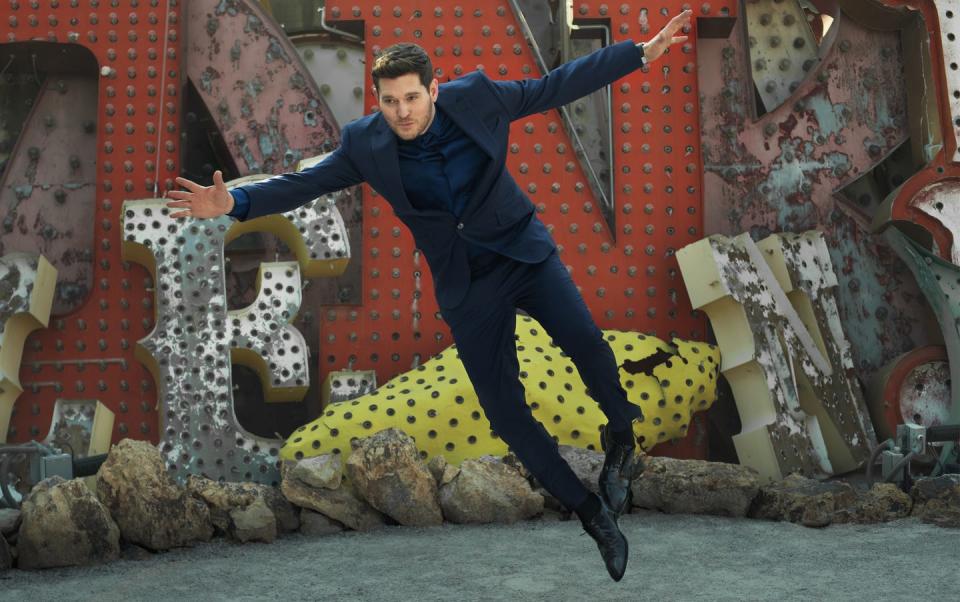
That may be true, but it seems like it does tap you into that Gen Z market.
It’s amazing because I was being interviewed by someone who was maybe 25 years old. She said she was a big fan and I said, “Thank you so much” and she said “I’ve been a fan for a long time” and I said “Thank you so much!” And she said, “Can I show you something?” And she pulled out a picture and it was of her and I, and I think she was like 8 years-old. And I felt like Tony Bennett. I truly was like, “Are you kidding me?” And what’s weirder is, if you gave me a truth serum and asked me how old I was, I’d answer that I’m 17.
Were you always an old soul? Growing up in Canada I know you always like the older generation of singers.
Well, the music I was listening to was from a different generation, but I was always a kid. I was always way younger and less mature than my age. But it was such a strange combination because I loved the music. It’s not like I wanted to dress in weird fedoras and shit, I just loved the music. It turned me on. And what’s even weirder was, I couldn’t understand why other kids my age didn’t feel the same way. It was sort of a trip for me, like “What are you not hearing that I’m hearing? How can you not know how great this is?”
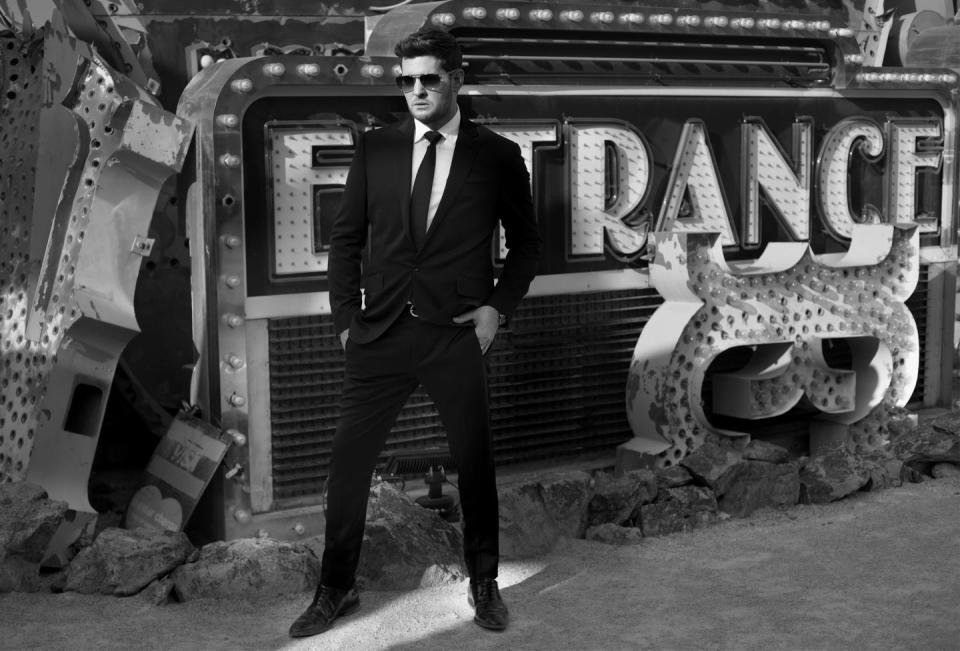
I feel like it was the same for me, I grew up in this Italian household where guys like Frank Sinatra were the man and I was surrounded by Italian culture, meanwhile no one really around me was Italian.
I know it’s your interview, but what did your buddies say to you?
I was just a strange dude. When I was in elementary school I only listened to 50s and 60s music. But even with the food, I was eating things like broccoli rabe and sausage and peppers while growing up in the Catskill mountains. Meanwhile, my friends were not eating stuff like that on a regular basis.
I won’t say it was strange, but you knew you were unique and special. Did people around you think it was weird?
I think I took it for granted that I grew up with all of these things that other kids didn’t. And looking back I was an odd kid regardless. But in a way, I think I liked being unique.
Totally! I always say that I had a special relationship with music no one else had and I felt it made me unique too. You know what’s really a trip? I didn’t ever force that music on my kids, but what’s crazy is that my 8-year-old and my 5-year-old gravitate towards the older songs. And I always think, could this be genetic? There's modern pop music everywhere, but when my 8-year-old asks me to play rock and roll, he means 50s-era rock and roll, like Elvis Presley. So for his birthday I bought him a record player and we went to the store and bought tons of Beatles records and that's what he digs.
Who was your gateway artist that opened your eyes to this genre of music?
I also grew up in a very Italian household and my grandpa loved Dean Martin, Tony Bennett, Al Martino and Frank Sinatra obviously, but it was Dean Martin for me. I think as much as we liked his music, my grandpa liked his personality. He was attracted to the kindness and that sense of humor, and the fact he was so cool and easygoing.
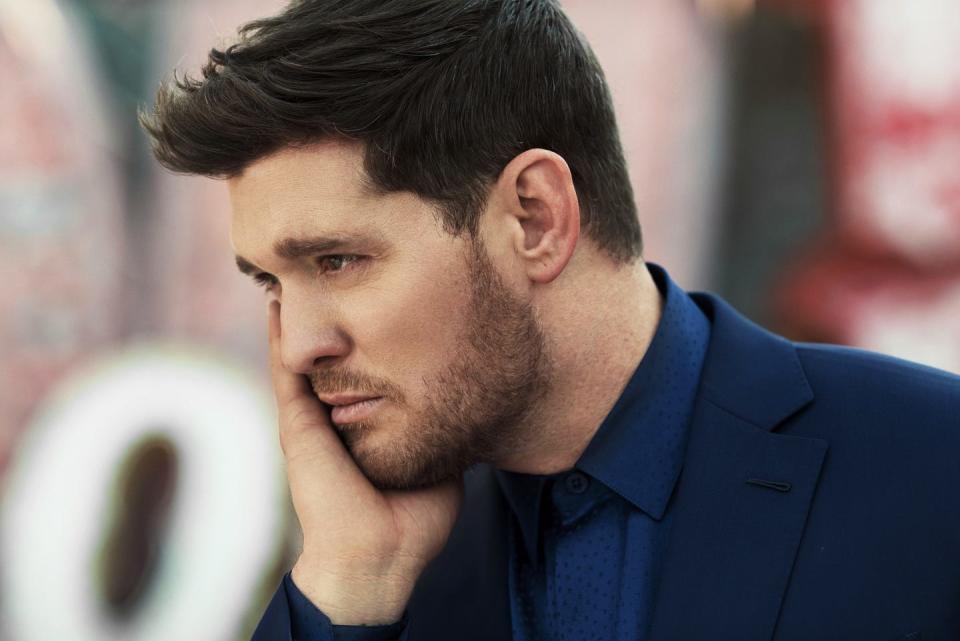
Did you ever see him live? I know in the late 80s he was on tour for a short time with Sinatra and Sammy Davis Jr.
No, I never got a chance. But can I tell you how many YouTube rabbit holes I’ve gone down to find everything I could possibly find or met older DJs and found old interviews? I want to absorb everything I can absorb of Dean’s.
The real obscure stuff is fun, like the bootlegs when the Rat Pack performed at Sam Gianacana’s Villa Venice outside of Chicago. Dean Martin does a fun version of “I’m Gonna Sit Right Down and Write Myself a Letter” and is later joking he doesn’t want to wake up the mobsters sleeping upstairs.
That’s hilarious. Have you seen the one when Johnny Carson is the MC? It’s unbelievable. Count Basie is the arranger. It’s just so swingin’ and the musicians are just so badass. That’s what I mean when I say, how can anyone not hear that and go, “Wow!” What was interesting for me was my first singing coach was one of (the members of the singing group) The Platters. And he started introducing me to Sam Cooke and Donny Hathaway and these great soul artists. I don’t know why, but I felt a connection somehow in their ability to tell stories and how gorgeous the tone of her voices were. Those became classics for me too—in addition to the Rat Pack era of singers. Even Willie Nelson, his Stardust record was a big one for me. It’s completely different in that he didn’t sound like a crooner, but I still loved the way he told those stories.
Frank Sinatra would swim on a regular basis to keep his lungs strong for his vocal power. Do you do anything like that?
Yeah, I read his biography as a kid and as a result I started to run, and I still do it today. I run on a treadmill as fast as I can and I try to sing the songs so when I get onto the stage I’ll have the breath control to hit the notes I need to hit… Actually, it’s funny. I’m not some fancy-dancy guy but the only thing I ask for in my hotel room is a treadmill.
I want to talk about your new album Higher. It’s an album that has a classic standard by someone like Sam Cooke and the next track is an original. I bet it’s daunting to juxtapose that. How do you strike such a balance and make it seem like one cohesive thing?
It’s interesting because I’ve always felt I live in a very strange world, especially considering human beings love to categorize: you’re this singer or that singer. Weirdly, I know it may not sound like it, but I’ve always considered myself a soul singer who loves swing. So I’ve found it much easier to write originals and found it far more daunting to reimagine and reinterpret these songs sung by the greatest interpreters of our age. So I think that was the most fun and challenging for me; coming up with concepts. I love cinema so much and the drama of it, so we try to come up with cinematic arrangements. On this record especially I got so lucky because I got connected with a great arranger named Nicholas Jacobson-Larson. He was a student of John Williams and to be able to work with him and trust to be on the same page was huge for me. I was able to try to reimagine a song like “Smile.” That idea came from Jimmy Durante and very old Hollywood romanticism. I love this music so much and I’m so fiercely protective of it and passionately enjoy it and really genuinely love it. I love being able to take something and conceptualize it and to give birth to something that may be old, but feels very new. And if I do it right, I come up with a record like this one where I hope it seamlessly flows.
How do you whittle it down and choose what songs to include on a 12-track album?
It’s pure love. It’s pure love. When I tell you it’s pure love, it doesn’t get whittled down. When you hear a song on a record that I recorded, it’s because I love, love, love that song and I completely believe in the concept that I was able to execute. For instance, that Same Cooke song “Bring It On Home To Me,” I have tried three times to record that song. The first time I wanted it as a duet. The second time wasn’t right and I didn’t feel like I earned the right to record it. The third time, I went with a bunch of great musicians and tried a kind of bluesy version and again, it didn’t work. On this record, I was sitting at the piano during the pandemic and was fiercely trying to remagine this song. And I’m not a good piano player, actually the shittiest piano player ever, and I sat and played the chords slowly. I went, (singing) “If you ever… Change your mind..” and on that chord I made a mistake. And the second I played that wrong chord, I knew that mistake was the greatest mistake I made. It completely opened the song and went from being Sam Cooke’s “Bring It On Home To Me” and much closer to something more like Donny Hathaway’s “Put Your Hand in the Hand of the Man.” I was so excited when I did it, I called my producer Bob Rock and I said, “Bob, I’ve unlocked it. I’ve unlocked it, Bob! I know what this is.”
So that’s years in the making. It’s not just you at the piano hitting the wrong chord once.
I’d say it took at least eight years.
So that’s eight years of thinking about it and thinking about it, and it’s not right, not right, not right, and then one wrong chord: boom! You got it.
Absolutely. Interestingly enough, when I went into the studio for my sessions with (the producer) Bob Rock, he said, “I want you to do Bob Dylan’s ‘Make You Feel My Love.” I said, “Bob, that is a great song and I love Dylan, but people like Adele have great versions, I don’t know.” And he said, “Well, go home and see if you can do your magic with it.” I went home, got into the shower and out of all the songs, I started to sing Lenny Kravitz’s “It Ain’t Over Till It’s Over” with those great 60s soul strings. All of the sudden I started to sing “Make You Feel My Love”, in that style, and it was one of the moments of me rushing into the studio late that night and going, “Bob! Bob! Check this out? I think we’ve unlocked this, we found a cheat code to make it fresh.” I sang it a couple times, singing to my kids and my wife. But those are the weird little magical things that happen. And by the way, sometimes they don’t. Sometimes you go for something and you don’t execute it as well. I don’t know why or how it happens, but I think that’s why I love this record so much because it’s probably the first time in my career where I felt like I executed on every one. If you can’t tell, I’m pumped. It’s a thrill and after 20 years with Warner, at 46 years old, to have this moment? Going back to what we were saying about our heroes, can you imagine what it’s like for a kid at 15 years old who idolized these guys and I get a chance to be a small part in keeping the legacy of these songs and the greatest gift America has ever given to the arts alive? I mean, I pinch myself that this is what I get to do.
But you’re also not a small part. You’re not just keeping it alive, you’re bringing it into a new generation and introducing new people to it in an entirely new way.
You’re very sweet, but why I say a small part is because I have now so many friends and artists who are younger and we love each other. I look and I see Connick Jr. and Jamie Cullum and I see a friend like Diana Krall. The other day I was with Jon Batiste and I said, “It’s so special for me that there’s a bunch of us.” We’re keeping the legacy alive and we’re creating a counterculture. And the fact that we admire each other and it’s not competition, it’s truly genuine appreciation for how each of us have sort of taken the root of jazz, and with the seeds sown by our heroes and now as the tree grows and there are different branches, and each of us have a small part in keeping it alive, so that as custodians of this genre, it doesn’t die, because it’s too good to die. I may make fun of myself on TikTok and love being silly, but when it comes to the music I take it dead serious. I feel like we all have this wonderful gift of the responsibility of honoring our heroes, truly.
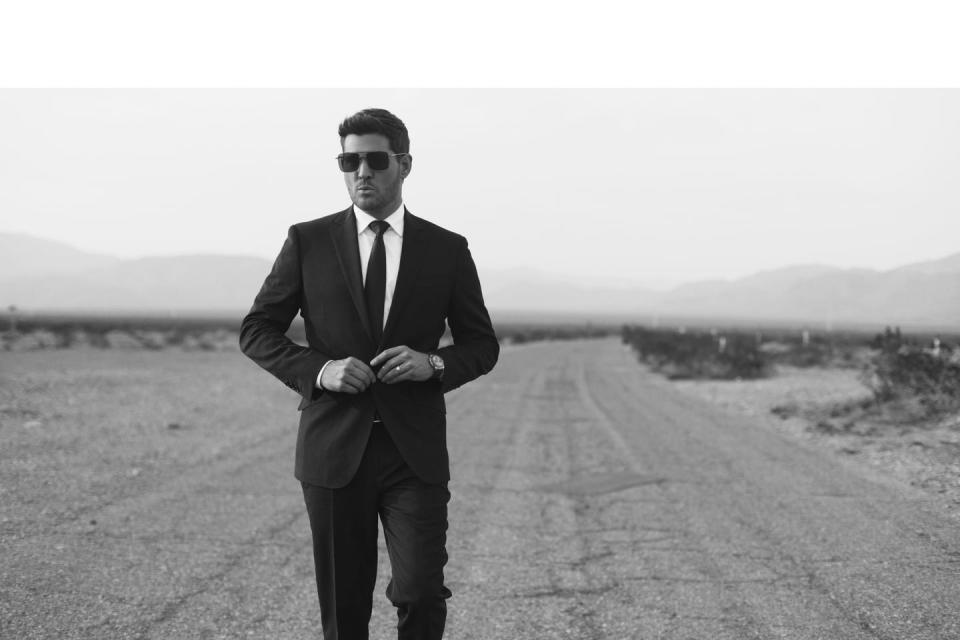
There’s a story with Tony Bennett, he was once forced to record something out of his regular style. It was music he didn’t believe in, and he physically threw up in the studio. The music was so important to him and he couldn’t go against what was inside of him.
Wow. Well, I should have mentioned Amy Winehouse too. She’s another one. Stylistically, it’s a different thing but there’s a base there. Tony loved her too. There’s a generation who has a ton of respect for the people who came before them. Imagine how amazing it is for when Amy or I had Tony Bennett come sing with us. Or for me, having someone like Sir Paul McCartney or Willie Nelson. My manager used to say all the time, if you walk like a duck and talk like a duck and are seen in the company of ducks, people will assume you are a duck. And it was always this amazing thing of being so grateful of having their stamp of approval because it brings great gravitas, and I don’t know if there’s another way to gain that credibility without your heroes saying, “I really like this singer.”
Tony and I talked about Amy Winehouse a lot, he just thought she was the greatest. Part of the chance of breaking out was having someone like Tony who cared about the art and actually cared enough about a young artist to lift them up. Without that, it’s hard to get there.
I have a semi-philosophical question for you. Do you think the Great American Songbook is an ever-changing, ever-evolving selection of songs or….
Yes.
It is? I’m trying to think of songs written in the past ten years that are considered a Great American Songbook song.
That’s interesting you say that. For me, ten years isn’t enough. There has to be a ripening and that ripening only happens through time. Here’s a good example. I would say that “What a Wonderful World” by Louis Armstrong in 1967 is part of it. When you think about the Great American Songbook, you don’t think 1967. But I think of that song as part of the Songbook.
I would have never thought that song was from that era.
Of course! You think, well that’s from 1958 or something. But because of the passage of time. By the way, I can talk about this shit all day. This is the love of my life. But I get asked every day, “Why do you think these songs are still around?” But for me, it’s an easy answer. They have the greatest melodies with the greatest lyrics that talk about something human beings can always relate too. We can all relate to being in love, having our hearts broken, needing hope.
I have to ask you about working with Sir Paul. How did that come about and what was it like?
He is beautiful and kind and generous. I can say simply, the fact that Sir Paul trusted me with his art means more to me more than anyone will ever know. I’ve been lucky to be an acquaintance for the last 10 or 12 years. As I was making this record, my manager showed me a note that Paul had sent through his manager, Chris. It just said, “We hear you’re making a record and there’s a song that means a lot called ‘My Valentine’ and we think you could kill it.” I put together a rough demo and sent it over to Paul’s manager hoping I’d hear back and two days later he called. He was complimentary about the arrangement idea and concept. I asked him, “Paul, it’d mean a lot to me if you helped me take a good concept and make it great.” He told me what the song meant for him and how he wrote the song for Nancy and the sentimentality of it. We met about a month later in New York and put together a big, beautiful session and it was amazing. I just wanted to make him proud.
I was reading an interview with Paul where an interviewer was goading him and saying, “What do you say to people who say you just rode Lennon’s coattails, that he really was the leader?” And the answer Paul gave was mind-blowing. He said, “Yeah, John was one of the greatest musicians who ever lived. And so was George. And so was Ringo. And it was an honor to be with them, but I don’t worry about those things because I know what I brought.” That was his answer, pure humility, no need to defend himself, no insecurity. And then the documentary Get Back comes out and the whole world gets to see the truth. And the truth is, Paul McCartney is a genius. And the truth is, when you’re so great, you don’t need to tell people.
Speaking of all the great singers, they all have a routine in the studio. Sinatra would dress to the nines and want to be physically in the middle of his orchestra as they played. He didn’t want a single imperfection because he knew his songs were going to be listened to until the sun burned out. Do you typically have a routine like that when you go in to lay down your songs?
No, no. My only routine is preparedness. I’m such a perfectionist. I say this as the God’s honest truth: a note has never left my lips without me caring deeply about it. And so I try to make sure conceptually that I’m in the moment. Having said that, it’s nice when the family’s there. When I sing a song I try to getthere, and it might sound cheesy but many times I’ll take my phone and lock the cover and have a picture of my wife and kids in front of me. When I need to reach deep, especially after what I’ve been through, it’s a lot easier for me to be honest in telling a story about that love. I guess it’s no different than an actor. Years ago I was on a television show with James Caan and I said, “Do you have any advice?’ He said, “Yeah, if you believe in the words that you’re saying you give the audience no choice to have them believe with you.” I always thought that was really beautiful.
You Might Also Like

